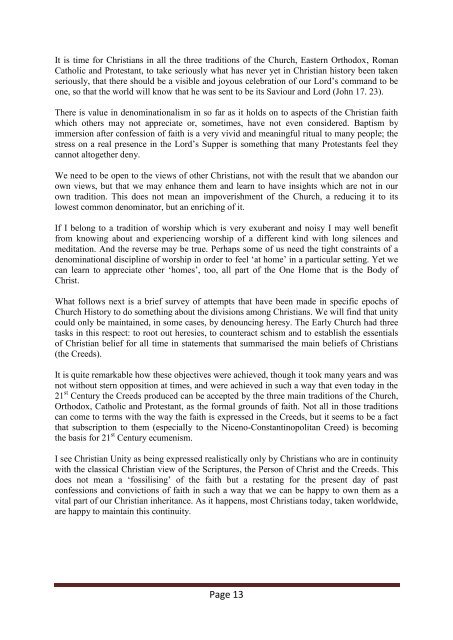Digging Out the Embedded Church - The Maranatha Community
Digging Out the Embedded Church - The Maranatha Community
Digging Out the Embedded Church - The Maranatha Community
Create successful ePaper yourself
Turn your PDF publications into a flip-book with our unique Google optimized e-Paper software.
It is time for Christians in all <strong>the</strong> three traditions of <strong>the</strong> <strong>Church</strong>, Eastern Orthodox, Roman<br />
Catholic and Protestant, to take seriously what has never yet in Christian history been taken<br />
seriously, that <strong>the</strong>re should be a visible and joyous celebration of our Lord‟s command to be<br />
one, so that <strong>the</strong> world will know that he was sent to be its Saviour and Lord (John 17. 23).<br />
<strong>The</strong>re is value in denominationalism in so far as it holds on to aspects of <strong>the</strong> Christian faith<br />
which o<strong>the</strong>rs may not appreciate or, sometimes, have not even considered. Baptism by<br />
immersion after confession of faith is a very vivid and meaningful ritual to many people; <strong>the</strong><br />
stress on a real presence in <strong>the</strong> Lord‟s Supper is something that many Protestants feel <strong>the</strong>y<br />
cannot altoge<strong>the</strong>r deny.<br />
We need to be open to <strong>the</strong> views of o<strong>the</strong>r Christians, not with <strong>the</strong> result that we abandon our<br />
own views, but that we may enhance <strong>the</strong>m and learn to have insights which are not in our<br />
own tradition. This does not mean an impoverishment of <strong>the</strong> <strong>Church</strong>, a reducing it to its<br />
lowest common denominator, but an enriching of it.<br />
If I belong to a tradition of worship which is very exuberant and noisy I may well benefit<br />
from knowing about and experiencing worship of a different kind with long silences and<br />
meditation. And <strong>the</strong> reverse may be true. Perhaps some of us need <strong>the</strong> tight constraints of a<br />
denominational discipline of worship in order to feel „at home‟ in a particular setting. Yet we<br />
can learn to appreciate o<strong>the</strong>r „homes‟, too, all part of <strong>the</strong> One Home that is <strong>the</strong> Body of<br />
Christ.<br />
What follows next is a brief survey of attempts that have been made in specific epochs of<br />
<strong>Church</strong> History to do something about <strong>the</strong> divisions among Christians. We will find that unity<br />
could only be maintained, in some cases, by denouncing heresy. <strong>The</strong> Early <strong>Church</strong> had three<br />
tasks in this respect: to root out heresies, to counteract schism and to establish <strong>the</strong> essentials<br />
of Christian belief for all time in statements that summarised <strong>the</strong> main beliefs of Christians<br />
(<strong>the</strong> Creeds).<br />
It is quite remarkable how <strong>the</strong>se objectives were achieved, though it took many years and was<br />
not without stern opposition at times, and were achieved in such a way that even today in <strong>the</strong><br />
21 st Century <strong>the</strong> Creeds produced can be accepted by <strong>the</strong> three main traditions of <strong>the</strong> <strong>Church</strong>,<br />
Orthodox, Catholic and Protestant, as <strong>the</strong> formal grounds of faith. Not all in those traditions<br />
can come to terms with <strong>the</strong> way <strong>the</strong> faith is expressed in <strong>the</strong> Creeds, but it seems to be a fact<br />
that subscription to <strong>the</strong>m (especially to <strong>the</strong> Niceno-Constantinopolitan Creed) is becoming<br />
<strong>the</strong> basis for 21 st Century ecumenism.<br />
I see Christian Unity as being expressed realistically only by Christians who are in continuity<br />
with <strong>the</strong> classical Christian view of <strong>the</strong> Scriptures, <strong>the</strong> Person of Christ and <strong>the</strong> Creeds. This<br />
does not mean a „fossilising‟ of <strong>the</strong> faith but a restating for <strong>the</strong> present day of past<br />
confessions and convictions of faith in such a way that we can be happy to own <strong>the</strong>m as a<br />
vital part of our Christian inheritance. As it happens, most Christians today, taken worldwide,<br />
are happy to maintain this continuity.<br />
Page 13








